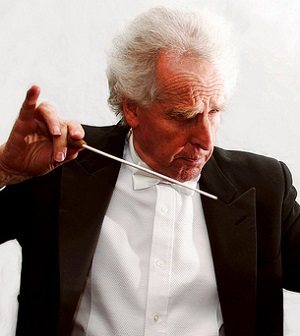Life Class

As a guest conductor, Zander has inspired orchestras from Scotland to St. Petersburg. His recordings of Beethoven and Mahler symphonies with the London Philharmonia Orchestra have garnered critics’ awards and Grammy nominations. “This account of the work heaps revelation on revelation,” writes music critic Paul Driver of Zander’s recently released recording of Beethoven’s Symphony No. 9, in London’s Sunday Times.
Zander’s appearance at Cary Hall will not involve an orchestra, though it will feature a piano. “It’ll be an evening of ‘possibility thinking’ and music making – a wonderful combination,” he said in a recent conversation.
After nearly 20 years on the podium, Zander has written, he had the life-changing realization that a conductor’s “true power derives from his ability to make other people powerful.” Once he understood that the core of his task was to “awaken possibility in other people,” he saw also that this insight had applications in places far from concert halls and practice rooms. So began his parallel career as an internationally sought-after inspirational speaker.
“I have had a double life – that of a musician and that of a speaker about leadership,” said Zander, who at age 79 still retains the accent of his native England despite having lived in the U.S. for most of his life. His message about creativity and leadership has reached from the boardrooms of Fortune 500 companies to the elite World Economic Forum in Davos, where he has appeared several times as a keynote speaker and been honored with the Crystal Award for Outstanding Contributions in the Arts and International Relations.
A passionate advocate for making classical music accessible to everyone, Zander has harnessed the power of the internet to reach a mass online audience. His 2008 TED talk on The Transformative Power of Classical Music, subtitled in 45 languages, has recorded over ten million views. The 20-minute presentation distills some of his major themes: that classical music is for everybody, that nobody is tone-deaf, and that music can give us access to otherwise inexpressible emotions.
“Everybody loves classical music – they just don’t know about it yet,” he tells the studio audience. He demonstrates the concept of “one-buttock playing,” by which he means physically moving with the flow of the music rather than sitting firmly planted on the piano stool. By extension, he says, this approach means “encouraging people to think and live outside the box and develop a more open-hearted way of being in relation to music, but also in relation to life.”
Zander has reached audiences across the world with the best-selling book, The Art of Possibility: Transforming Professional and Personal Life, co-authored with his former wife, the psychotherapist Rosamund Stone Zander. Packed with stories from their different but complementary professional lives, the book outlines twelve practices geared to helping readers make a “total shift of posture, perceptions, beliefs and thought processes.”
Zander acknowledged that his Cary Hall talk comes at a challenging time in the life of the Boston Philharmonic Youth Orchestra. A November 5 report in the Boston Globe outlined discord in the organization following the arrest of an artistic advisor in September 2018 and the more recent dismissal of an associate conductor.
On November 9, over 70 parents of the orchestra’s young players responded to the Globe Editor with a strong letter of support expressing confidence in Zander’s vision and the orchestra’s administration, and satisfaction with the organization’s careful and respectful handling of an “unfortunate situation.”
“I’m not saying I welcome the trouble we’re in,” said Zander, who is clearly shaken by recent events, “but here’s the question: how do you deal with it? With despair and anger and fighting back, or do you create a new conversation?”
Any situation, however difficult, can be approached in the spirit of possibility, he said, and that means having the discipline to keep a constructive, creative frame of mind, using language with care and clarity, and being energized by love rather than fear.
In Lexington, Zander looks forward to engaging with an audience of people who “care about kids, care about education, care about music,” and to sharing insights from a long and extraordinary life full of challenges and still radiant with possibilities for communicating energy and joy.
An archive of Zander’s performances, lectures, writings and interpretation classes is available at:www.benjaminzander.org
